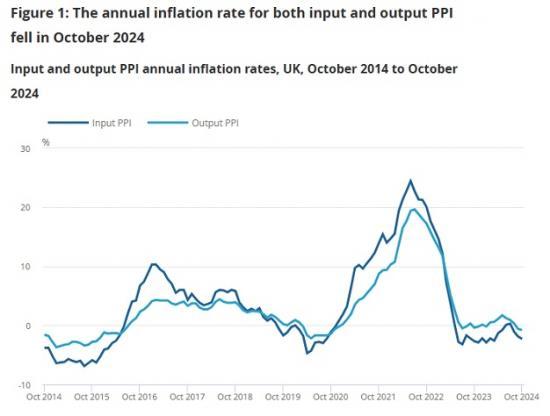Producer Price Inflation UK October 2024
20th November 2024

Producer input prices fell by 2.3% in the year to October 2024, down from a revised fall of 1.9% in the year to September.
Producer output (factory gate) prices fell by 0.8% in the year to October 2024, down from a revised fall of 0.6% in the year to September.
On a monthly basis, producer input prices rose by 0.1%, while output (factory gate) prices were flat at 0.0% in October 2024.
Crude oil continues to be the largest contributor to falling input prices.
The fall in the annual inflation rate for output prices between September and October was more than accounted for by lower prices for refined petroleum products.
Producer price inflation rates
Producer input prices fell by 2.3% in the year to October 2024. This is down from a revised fall of 1.9% in the year to September (Figure 1). Monthly input prices rose by 0.1% in October 2024, following a revised fall of 0.5% in September (Table 1).
Producer output (factory gate) prices fell by 0.8% in the year to October 2024. This is down from a revised fall of 0.6% in the year to September (Figure 1). Monthly output prices were flat at 0.0% in October 2024, following a revised fall of 0.4% in September (Table 1).
Estimates for both September and October 2024 are provisional. Figures for the latest 12 months are subject to revisions as additional survey data are returned and validated. Effective response rates at the time of first publishing can be found in Section 7: Data sources and quality.
Because of rounding, inflation rates in this bulletin may not correspond to index value changes, and contributions to the rate may not add up to the rate exactly.
Input producer price inflation
Of the 10 product groups for the input Producer Price Index (PPI), 5 made downward contributions to the annual inflation rate in October 2024. The largest of these came from inputs of crude oil, inputs of "other parts and equipment" and inputs of fuel, which contributed negative 1.45, negative 0.78 and negative 0.46 percentage points, respectively (Figure 2).
The price of inputs of crude oil fell by 22.5% in the year to October 2024, compared with a fall of 18.6% in the year to September (Table 2). This is the lowest the annual rate has been since July 2023. Inputs of crude oil also provided the largest contribution to the change in the annual inflation rate between September and October 2024, with a downward contribution of 0.29 percentage points.
Despite making the second largest downward contribution to the annual rate, prices for "other parts and equipment" increased by 0.5% in the year to October 2024 (Table 2). This downward contribution was caused by the weight changes introduced to the PPI in February 2024. For worked examples, see the scenarios in Section 7: Data sources and quality.
The prices of inputs of fuel fell by 9.9% in the year to October 2024, compared with a fall of 10.6% in the year to September (Table 2). The main contributions to this fall came from electricity and gas prices, which fell by 8.0% and 16.9% in the year to October 2024, respectively.
The largest offsetting upward contribution came from inputs of domestic food, which contributed 0.43 percentage points (Figure 2). Prices for inputs of domestic food increased by 1.6% in the year to October 2024 (Table 2). This upward contribution was partly caused by a decrease in the supply of potatoes, which pushed their prices up.
The prices of materials and fuels imported by UK manufacturers fell by 5.9% in the year to October 2024, following a revised fall of 5.2% in the year to September. On a monthly basis, prices saw a 0.1% increase between September and October 2024, compared with a revised fall of 1.8% between August and September. The fall in import prices in the year to October 2024 may partly reflect the higher level of sterling, which rose by 5.3% in the same year (Table 3).
Output producer price inflation
Of the 10 product groups for the output Producer Price Index (PPI), 4 made downward contributions to the annual inflation rate in October 2024. The largest of these came from outputs of chemicals, outputs of paper and printed material and outputs of coke and refined petroleum products, which contributed negative 1.12, negative 0.99 and negative 0.72 percentage points, respectively (Figure 3).
However, despite providing the two largest downward contributions to the annual rate, prices for chemicals and paper increased by 0.6% and 0.2%, respectively in the year to October 2024 (Table 4). The downward contributions were caused by the weight changes introduced to the PPI in February 2024. For worked examples, see the scenarios in Section 7: Data sources and quality.
Prices for coke and refined petroleum products fell by 26.2% in the year to October 2024, compared with a fall of 22.1% in the year to September (Table 4). This is the lowest the annual rate has been since August 2023. Petroleum also made the largest contribution to the change in the annual inflation rate in October 2024, with a downward contribution of 0.39 percentage points.
In comparison, the largest offsetting upward contribution came from "other outputs", which contributed 0.99 percentage points. The main contribution to this rise came from soft drinks; mineral waters and other bottled waters for domestic market, which saw a price rise of 2.7% in the year to October 2024.
Read the full ONS report with graphs and links to more details HERE
